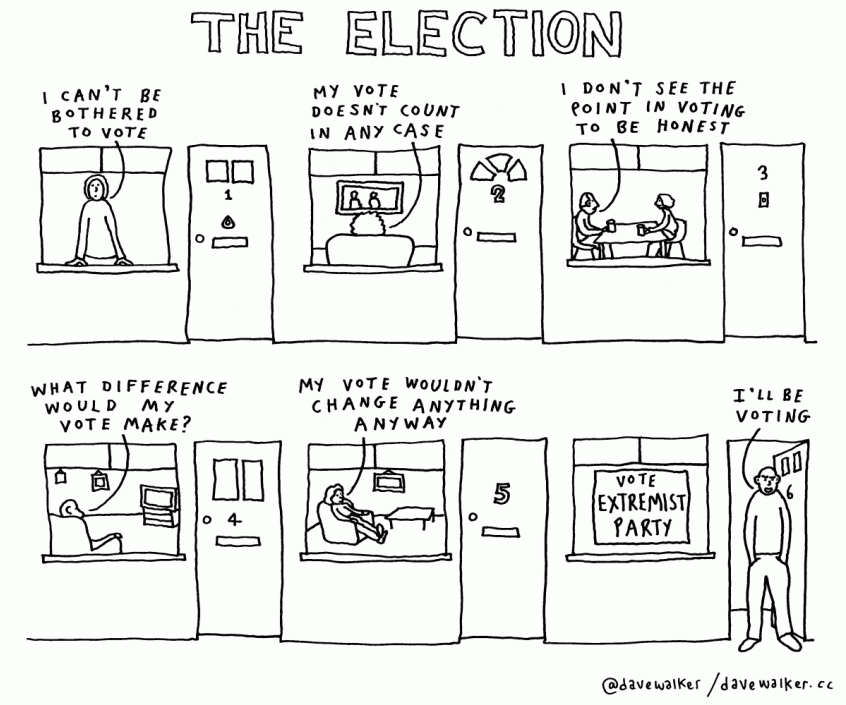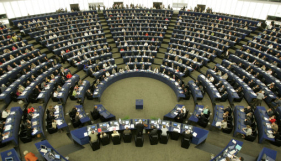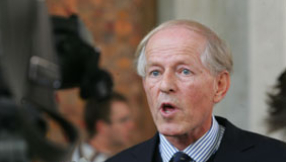
The excitement reached fever pitch this week. The parties were planned, everyone had marked their favourites and tens of thousands of us were going to be voting to determine who came out top in Europe. This glorious festival of democracy really is a sight to behold. But enough about Eurovision...
This month not only sees the pan-European cheese-fest of wailing, warbling and Austrian drag queens with beards... It also brings us the European Election. Forget the spangly outfits, acerbic commentary and toe-curling crooning. This is about men (sadly still mostly men) in grey suits competing for our votes at the ballot box.
And while it may not have millions of us tuned in on a Saturday night, the outcome of the election will have a direct impact on all of our lives...
So here are some answers to a few key questions:
How Many MEPS are there?
There are 766 of them. Which may sound like an awful lot, but when you consider they represent more than 500 million people in 28 countries across Europe, you can see why there are so many... Each region in the UK has a group of MEPs, rather than individual representatives of each constituency, like in Westminster elections. MEPs sit in Party groups, but these don't exactly correspond to the parties we have here. The biggest groups are the centre right European People's Party and the Progressive Alliance of Socialists and Democrats (where Labour MEPs sit). David Cameron's decision to leave the EPP and form a new group - European Conservatives and Reformists - has proven controversial, given some of the parties he found himself alongside.
What do MEPs do?
Their role is different to MPs in the UK, in that the European Parliament doesn't really make laws. It actually amends and debates them. This has led to accusations that they don't really carry out the function we expect of elected politicians. The European Commission, which isn't directly elected, is the seat of much of the power within the EU. It's the job of MEPs to hold Commissioners to account. MEPs also have a role in setting the EU's budget - so there is still worth voting for...
When are the elections happening?
On May 22, when a lot of us across the UK also have local council/mayoral elections. So there's a double helping of democracy for those (like me) who get excited about these things...
Why is turnout traditionally low? Why the apathy?
Ask yourself if you can name your MEP. (Go on, give it a try. Reward yourself with an ice cream if you can name more than one). And therein lies at least part of the problem. Recent research showed such low levels of familiarity with our representatives, it's hardly surprising we're not rushing out in droves to vote.
There's a lot of talk about democratic deficit - basically the idea that European politics is complex and distant and that even those who care find it hard to tell apart the different roles of the Parliament, the European Commission and other EU bodies. The media in the UK doesn't help, with its polarised reporting of European politics only adding to the idea that sensible people don't get involved.
What's likely to happen? Who's likely to get in and why?
Trying to predict the outcome of an election across 28 countries is a thankless task. Each of them have their own internal politics which play into the European vote. In the UK, the rise in profile of UKIP has been matched by some impressive poll numbers. But the polling is changing almost daily. It looks certain that either Labour or UKIP will win the most votes with the Conservatives trailing in third. Mid-term elections like this often end badly for the party which is in national government at the time, so the Conservatives wouldn't usually be too worried. However, the UKIP surge over recent months makes Nigel Farage the joker in the pack this time.
What is all the fuss about UKIP?
For a Party with no MPs, and considering they have absolutely no hope of forming the next UK government, there is an awful lot of media attention on them (he says, while adding to it...).
The United Kingdom Independence Party has gone from being a single issue campaign group (trying to remove the UK from the EU) to a significant minor party. Despite a series of revelations that the party is home to a number of crackpots, racists and various other ne'er-do-wells, Nigel Farage remains an accomplished media performer. He is often pictured in a country pub with a pint in his hand - masquerading as a man of the people. The fact that he is a privately educated former City trader is played down by UKIP.
However, before dismissing him, it's worth acknowledging that he has tapped into the scepticism many British people do feel about the EU. It seems Farage is able to articulate the fears and worries of a significant chunck of the British electorate when faced with a European Union that undoubtedly feels distant and remote.
UKIP has broadened its message to encompass anti-immigration rhetoric and this election has seen it not only opened up to much more media scrutiny, but also targeted by the anti-fascist group Hope Not Hate. Were UKIP to top the poll on May 22, not only would they have a good number of MEPs, it would also set them up for a year of heavy campaigning in which they will attempt to gain their first MP in Westminster. Whether they achieve the 'political earthquake' Farage is predicting would seem to be in the balance...
Is there a 'Christian Vote?'
In a word, no. The UK doesn't have a history of Christian political parties, unlike, say, Germany, where the Christian Democrats are one of the largest parties. So in this election, as always in the UK, Christians will vote for a spread of parties. Recent research from Theos showed just how those votes tend to break down.
Should Christians bother with the Euro election?
YES!
You don't have to be an eminent political theologian to work out that it is the duty of every Christian to seek the welfare of their city. In this context, that means voting in the European Election. You may not understand the nuances of the system, but to take some time to find out about the main candidates and their manifestos is a worthwhile exercise. You can find out more about your current MEPs here. There's a good guide to the parties and their manifestos on the BBC website.
A lot of UK law now originates in Europe. Although the big decisions on taxation, war, education and healthcare are still made in London (Belfast, Cardiff & Edinburgh too), the EU plays a massive role in areas like international trade and aid, climate change, agriculture and an increasing role in foreign policy. The treatment of Greece, and to a lesser extent Italy, whose elected leaders were effectively replaced by unelected technocrats, was made possible by the EU. It is the vehicle through which those countries with major power and money use their influence within Europe.
Whether you love or loathe the EU, there is a role to play for you in the election. In the 2009 European Election, the racist BNP polled a million votes, and won two seats in the European Parliament. If you don't turn up and vote, they stand a better chance of being at the heart of decision making in Europe for the next five years. That alone should be enough to get us all to the polling station.
Andy Walton works for the Contextual Theology Centre in east London. He is a regular commentator on current affairs on BBC Radio Five Live, and has written on whether Britain has an emerging 'Religious Right.' He has contributed to The Church Times, Christianity magazine, The Independent, The New Statesman and Third Way.














